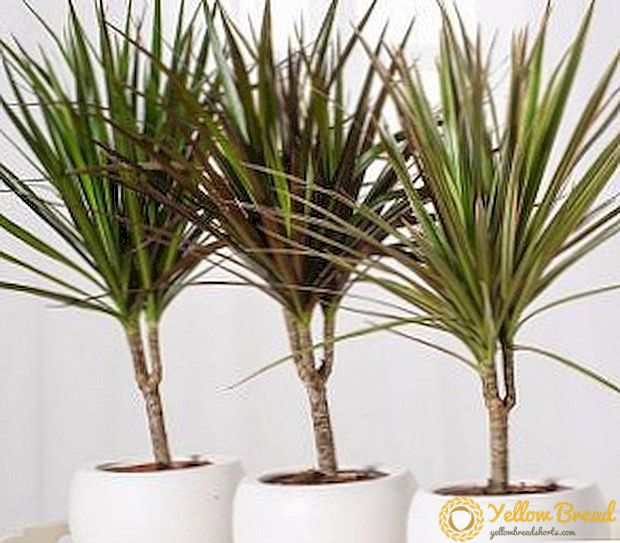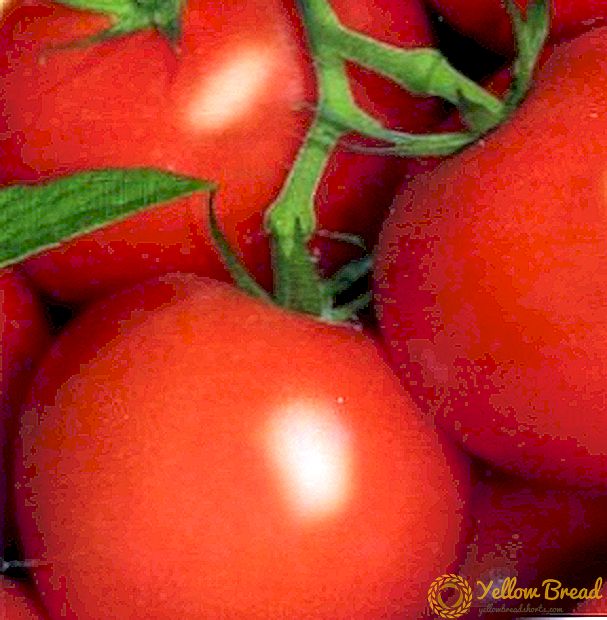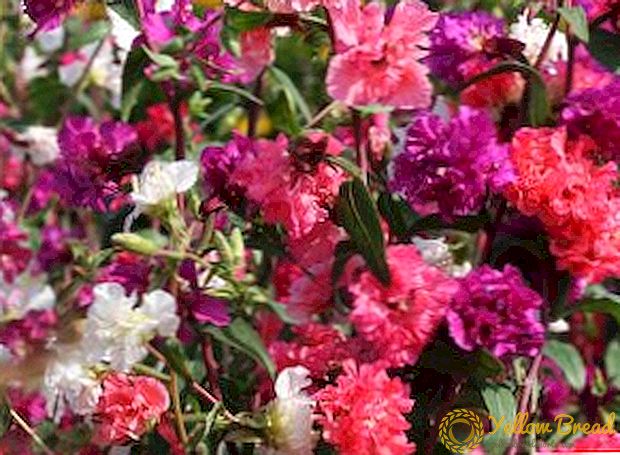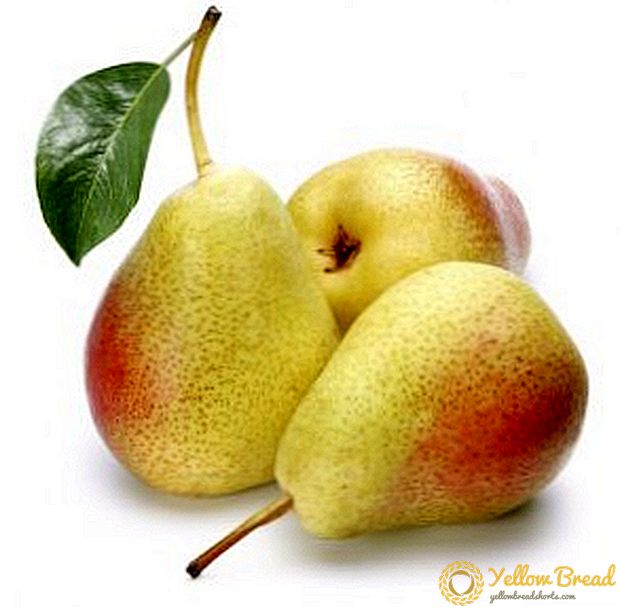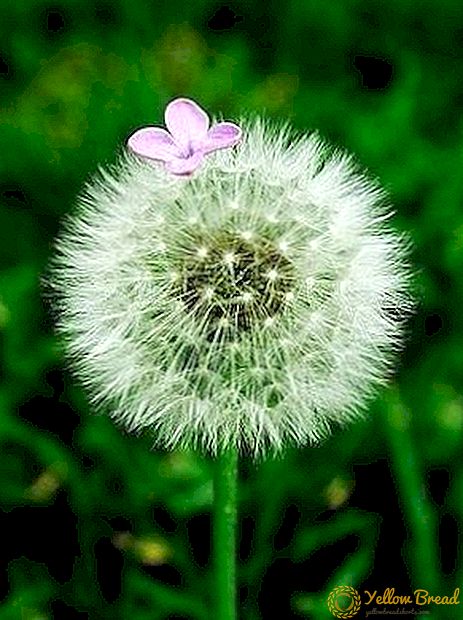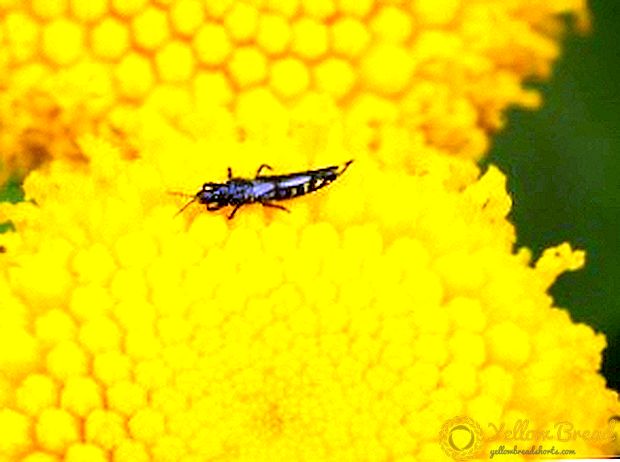
Very tasty and healthy black grapes.
It contains many antioxidants, it strengthens the cardiovascular system, is able to lower cholesterol levels.
Black grape berries are great for making wine.
Today we will get acquainted with the best grades of black grapes.
- Variety "Delight black"
- Black grape Kishmish
- About grape variety Black Finger
- Table grapes "Autumn black"
- Wine grape variety "Odessa black"
Variety "Delight black"

Variety Delight black refers to table grape varieties. He has female flowers, so he needs pollinators. It is characterized strong-growing and powerful bushes. The variety has large clusters of cylindrical and dense form.
The berries are large, mostly oval or round, colored in dark blue, pleasant, sweet in taste, their flesh is fleshy. Shoots ripen well. The grapes begin to bear fruit in the second year after planting. There are about 50 buds on one bush.
Black gives delight high yields.
The harvest of grapes can begin to collect from mid-September, as they ripen in 125 days.
Pros varieties Delight black:
- high yields;
- resistance to mildew and oidium;
- excellent frost resistance, up to -25 degrees.
Lack of grapes Delight black:
- affected by gray mold
Variety Black Delight is recommended to be grown on large areas, because the shape of the bushes needs a powerful formation.
The seedlings are planted on the sunny side, in a well-drained land, there should be no water stagnation and bogging. The soil begins to prepare for three weeks. It is first digged, then if the soil is acidic, then add lime.
And in poor soils make manure and complex mineral fertilizers. Soil temperature should not be below +10 degrees. The cuttings are planted in a planting hole 60 cm deep and 50 cm wide. The soil is then fertilized with phosphorus-potassium fertilizer and watered.
Delight black is planted in the fall and spring.
Variety Delight black requires regulation of shoots and fruits. We can not allow a strong density of bushes, because it can lead to the death of pollinated inflorescences. Before the flowering of the inflorescences begins, the gardeners take measures to pinch the tips of the shoots. For the winter you need to cover him.
Black grape Kishmish

Black grape Kishmish is considered one of the oldest varieties, in the berries of which there are no seeds. These are grapes of early-medium ripening period.
Kishmish has leaves of medium size, round shape, slightly raised. He has a bisexual flower, so he does not need a pollinator. The clusters resemble a cylinder. The black Kishmish berries are slightly flattened below and elongated from above, they are oval in shape, of medium size.
The berries are painted black, on a thin skin there is a wax coating. The flesh is crispy and dense, moderately sweet. Shoots ripen pretty well. Grape bushes grow much.
Grape yields are medium but stable.
It is possible to pick ripe berries after 130 days from the beginning of the growing season.
Advantages:
- Kishmish berries do not have seeds
- Easy to transport, keeping your appearance
- Early ripening
Grape variety Kishmish black at all unstable to oidium, it is easily damaged by a grazard leafworm and anthracnose For the winter he needs shelter, as he does not tolerate severe frosts.
The crop needs to be torn off as soon as it is ripe, and the berries lose their commercial quality.
To plant Kishmish black grapes should be on a spacious area, as the bushes should grow at a decent distance from each other,the distance in the row should be about 2.5 meters, and between the rows - 3 meters. The site should be without drafts, with good solar lighting. When planting seedlings, you need to try to keep the roots as deep as possible in the ground.
You need to plant in the spring, so that in the course of the summer he will start well and gain strength.
Care for the Kishmish black variety is in moderate irrigation, but two weeks before harvesting it is not watered, only irrigation of the land between the rows is carried out. Feed with nitrogen fertilizers before the start of the growing season.
During the season they fertilize with sulphate, and when ovaries appear, the grapes need mineral fertilization. Grapes need support.
Since the variety is Kishmish black non-frost resistant, it needs to be covered. You should also cut off a weak vine, and large shoots are covered with straw, because the roots must be warm.
About grape variety Black Finger

Grape variety Black finger, or as it is also called Black-finger, refers to the late varieties, in the berries of which there are no seeds.
Berries are large, black, in shape resemble a finger (hence its name appeared). They taste good. Grapes needs constant treatment with antifungal agents.
The flesh is fleshy. The mass of one bunch can reach two kilograms. Flower bisexual. Grape bushes vigorous. The black finger has large and large clusters.
The variety brings high and stable yields.
The grapes ripen on the 120-130 day.
Advantages:
- Frost resistance;
- High transportability of bunches of grapes;
Variety Black finger is not suitable for cultivation in the northern regions.
Planted seedlings with a well-developed root system and matured shoots. Before planting, shorten the roots by 15 cm, and the sick and frozen ones are removed. In addition to the roots, they also remove the sprout, leaving 4 lower buds on it, which matured well. Then trimmed root system dipped in the prepared mixtureconsisting of manure and water.
The landing pit is dug up to 80 cm deep and about 100 cm wide. Drainage is laid out at the bottom of the pit, broken bricks, sand or crushed stone can be used. The excavated earth is mixed with humus, superphosphate and potassium chloride, then it is poured into a hole.
A hillock is made at the bottom and a cutting is placed there, the roots are spread and slowly, evenly covered with the rest of the ground, to the top of the pit. Then the plant is watered.
Black finger planted in the spring, in May.
Care for the variety Black-finger consists of watering, fertilizing manure and nitrogen-phosphorus and potash fertilizers. In order for the vine to ripen better, stepchildren, who appear, break out, and pinch their tops.
Table grapes "Autumn black"

Shrubs are vigorous. Berries oblong egg-shaped, color - black, but may be purple, large size. Peel covered with wax.
Grapes are very tasty, sweet, slightly sour, but everything in moderation. The pulp is average in density, resembles marmalade. The clusters are dense, conical. The flowers of this variety are bisexual.
Grade Autumn black makes loads well, easily adapts to any formation. On one shoot it is fastened on 3 brushes.
It requires the application of mineral fertilizers in moderate quantities, which leads to greater fruiting. In dry weather, it must be watered frequently. This variety can even grow a gardener lover.
Variety Autumn Black Grapes excellent yield.
This is an average, and with a load and srednepozdny, and late variety in terms of ripening berries.
Main advantages varieties are:
- Frost resistance, well maintained to a temperature of -20 degrees.
- Increased resistance to mildew, oidium and gray rot.
- Loose clusters in the refrigerator can be stored for up to 5 months.
Perhaps the biggest drawback of the Autumn Black variety is that when the temperature drops the berries may be affected by gray mold.
Autumn black grapes are planted in the area where the groundwater level is as low as possible, otherwise the plant may die.
Before such an important event as planting, a hole is dug out in two weeks, its depth should be 80 cm, and a width of about 60, a little more. When planting, mineral fertilizers are applied (superphosphate, potassium sulfate, added wood ash).
The bottom of the landing pit is sprinkled with a layer of humus and black soil. Planted grape cuttings are watered with warm water only.
Autumn black seedlings are suitable for planting in autumn, in September, and in spring, at the end of April.
For the winter, the Autumn Black variety is covered, since even short-term critical temperatures (below -20) can damage the roots.
Wine grape variety "Odessa black"

The crown and leaves of the young shoot are colored green with a red tint. The leaves are small, medium, solid, rounded. The upper leaf blades are raised up. With the arrival of autumn leaves are painted in wine-red color. Excavation at the stalks is open. Flower bisexual.
Grape clusters of medium size, conical shape, loose. Their weight ranges from 140 to 280 grams. The berries are round, black, covered with wax coating, with juicy pulp. The skin is firm.
Grape juice has a beautiful ruby color. The taste of berries is solanaceous, with a cherry-thorny flavor. There are seeds in the berry. The strength of the shoots is average, the vine ripens by 80%. From this variety make red dry and dessert wines top quality.
Yields are high and permanent.
Ripe grapes begin to pluck after 160 days from the beginning of the growing season, around the end of September.
pros Odessa black grapes:
- resistance to gray rot and oidium;
- increased winter hardiness.
Lack of variety - this is late ripening of berries.
For planting seedlings digging a hole to a depth of 10 cm, and 80 cm in diameter. Grape cuttings are buried completely; only the upper bud should remain on the ground.
The pit is fertilized with manure or compost, nitrogen and mineral fertilizers are applied.After the grapes are planted, the ground is watered around it, covered with a small layer of manure and sawdust.
Planting time depends directly on the age of the seedling or cutting. Annual seedlings are planted in April, green ones - in the middle of May. Biennial cuttings and seedlings are planted in October until the first frost.
Grade Care grape Odessa black is:
- Regular watering of grapes, about 3-4 watering per month. Additionally, water during the flowering period, and finish watering a week before the berries ripen.
- Weed removal, soil loosening.
- Sometimes they spend podzimnye watering.
- On the roots, before the arrival of winter, they hold such an event as katarovka, or put special covers on the roots.

